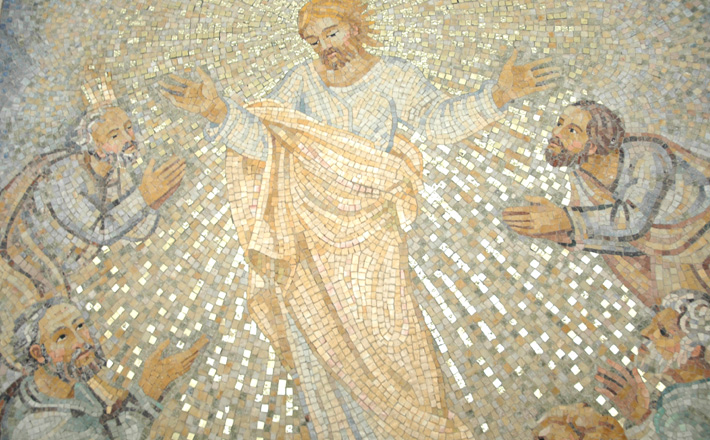Commentary on Matthew 17:1-9
Mystery marks this transfiguration scene. Jesus is transfigured.
Jesus is transfigured. Moses and Elijah appear and then strangely disappear. Peter is perplexed. James and John are anonymous. God quotes Godself. The disciples are overcome with awe. Jesus tells them to say nothing about what has happened! Mystery and divine presence are pervasive.
The scene unfolds in three movements. The first, Matthew 17:1-4, highlights Jesus’ transfiguration. In the second, 17:5, God speaks. In the third, 17:6-9, the disciples respond. The setting on a mountain suggests something significant will unfold (compare to Matthew 4:8; 5:1; 14:23; 15:29-38). The presence of three disciples indicates continuity with the previous, important scene of Jesus’ teaching (Matthew 16:21-28).
Jesus’ Transfiguration
Jesus’ transfiguration employs two conventional motifs of encounters with and revelations of glorious divine power and presence, namely a shining face and white clothing (Matthew 17:2). Moses descends from Mt Sinai with a shining face (Exodus 34:29). Heavenly beings wear white clothing (Daniel 7:9; Mark 16:5). And the vindicated righteous will “shine like the sun” (Matthew 13:43) and wear white robes (Revelation 7:9).
Moses and Elijah appear and talk with Jesus. Both encountered God on Mt Sinai/Horeb in circumstances of dangerous kings and rejection (Exodus 34, Pharaoh; 1 Kings 19, Ahab). Both were significant figures in revealing God’s will in the law (Moses) and as a prophetic leader (Elijah). Jesus’ association with them emphasizes his similar tasks and identity: to confront Rome’s oppressive rule, reveal God’s will, experience rejection, and be vindicated by God (Matthew 16:21).
Peter boldly takes the initiative (Matthew 17:4). He informs Jesus that it is good for the three disciples to be present — though without explaining why. He then offers to build three booths, again without explanation. The term “booths” evokes places of divine encounter in the Exodus story: the tent of meeting (Exodus 33:7-10) and the tabernacle for the ark of the covenant (Exodus 40:2, 17-22).
God Talks Peter Down
Peter’s offer, though, comes to naught (Matthew 17:5). For the second time in the Gospel, previously in Jesus’ baptism (Matthew 3:16-17), God speaks directly. God’s presence is signaled by the “bright cloud,” a common symbol of divine presence (Exodus 19:9; Ezekiel 1:4), The verb “overshadowed” recalls the tent of meeting (Exodus 40:35) and the exodus through the sea (Wisdom 19:7).
God speaks from the cloud and repeats the declaration from Jesus’ baptism (Matthew 3:17). God again announces Jesus’ identity as God’s son or agent. The term “son” designates Israel (Hosea 11:1), kings (Psalm 2:7, “my son”), and the wise person (Wisdom 2:10-20) as agents in special relationship with God to do God’s will. Israel is called into covenant relationship to be a light to the nations (Isaiah 42:6). Kings are called to represent God’s rule (Psalm 72). The wise person lives righteously according to God’s leading and opposed by enemies. God declares Jesus to be this agent, this son.
Such a claim imitates and contests. The term “son of God” commonly designated Roman emperors, both the adopted and the natural born. Augustus was the adopted son of the deified Julius Caesar. Other first-century emperors — Tiberius, Nero, Vespasian, Titus, and Domitian — were designated sons of gods. The term recognizes their roles as agents of the gods. They embodied exalted status and great power. They imitated the gods and enacted beneficial rule on their behalf. So, to call Jesus God’s son defines him as having similar roles and sets him in contestive and imitative relation to imperial claims.
God again expresses love for Jesus and announces that God has “chosen” him. This is a better translation than “well pleased.” The verb expresses choice in passages such as Psalm 68:16; 1 Maccabees 10:47, 14:41. Its use here highlights Jesus’ God-chosen identity and destiny, as does the divine plea: “listen to him.”
What Has Jesus Said?
What is revealed in this revelation of Jesus’ glory? This divine appeal to listen to Jesus urges attention to what Jesus has just announced about his destiny and about the destiny of disciples in the previous scene (Matthew 16:21-28). God has confirmed the disciples’ confession of Jesus as Son of God (Matthew 14:33; 16:16). God has also confirmed Jesus’ announcement of what he must do as God’s agent. He must go to Jerusalem, the center of power for the Rome-allied Jerusalem elite. He will confront these rulers. They will kill him. On the third day, God will raise him (Matthew 16:21).
Moreover, Jesus has announced he will return in glory as the Son of Man to establish God’s empire (Matthew 16:27). He evokes the figure from Daniel 7 to whom God commits everlasting “dominion and glory and kingship, that all peoples, nations, and languages should serve him” (Daniel 7:14). This return is imminent, “Some standing here will not taste death before they see … ” (Matthew 16:28)
The divine appeal to listen to Jesus also confirms Jesus’ declaration about the implications of his destiny for disciples. Peter had resisted Jesus’ teaching about his crucifixion (Matthew 16:22-23), but Jesus had gone on to outline that disciples too walk the way of the cross if they are to share in Jesus’ glory (Matthew 16:24-25).
This transfiguration passage functions, then, in part as a plot summary in anticipating these events in Jerusalem. It also sets out a theological scheme that sanctions Jesus’ crucifixion and eschatological return in glory to establish God’s empire in God’s purposes. Moreover, it provides divine sanction for Jesus’ tough teaching for disciples. The pressure is on his followers to be faithful in challenging circumstances.
Disciples Respond
The three disciples respond by falling to the ground, an appropriate response to divine presence (like the magi, Matthew 2:11). Their “fear” also appropriately highlights the divine presence that pervades the scene (compare 1:20; 9:8; 14:27). Jesus provides reassurance and Moses and Elijah mysteriously disappear (Matthew 17:8).
Jesus orders the disciples’ silence until after the resurrection (Matthew 17:9). The command focuses attention on the disciples’ need first to understand Jesus’ multi-faceted destiny. Then they can proclaim it. Jesus’ resurrection will confirm the reliability of his declaration in 16:21 and of God’s sanctioning presence here. Such confirmation could encourage followers in walking the way of the cross.


February 26, 2017